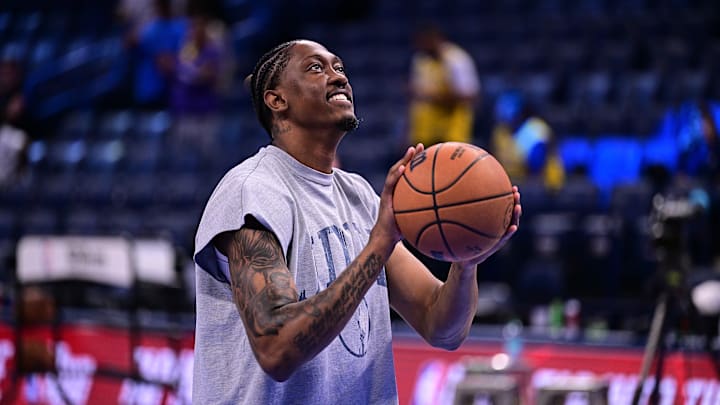The Oklahoma City Thunder are off to a league-best 15-1 start this season, and Jalen Williams has not played a single minute yet.
Williams "underwent a follow-up procedure on his surgically repaired right wrist to remove a screw that was creating irritation during the final stages of his return-to-play process" in late October, according to ESPN's Tim MacMahon. The Thunder haven't issued an update on his status since then, although he figures to return sooner than later.
OKC hasn't skipped a beat in his absence. The Thunder once again have the NBA's best defense by a country mile, and they're well ahead of any other team in net rating, too. That isn't to say there's some Ewing Theory potential in play here — the Thunder are clearly better with J-Dub than they are without him — but his early-season absence could have two major long-term benefits for them.
How J-Dub's injury could help the Thunder
With Williams sidelined, Ajay Mitchell has moved into a much larger role than he played as a rookie last season. He doesn't appear inclined to give up that rotation spot, either. Mitchell is averaging 16.1 points per game — the third-highest total on the team — along with 3.8 rebounds, 3.8 assists and 1.8 steals in only 28.2 minutes per game.
Because Thunder general manager Sam Presti is a warlock, he apparently saw this breakout coming from Mitchell. The Thunder originally signed him to a two-way contract after selecting him with the No. 38 overall pick in the 2024 draft, and they converted him to a standard two-year, $6 million deal with a $3 million team option in February. They proceeded to decline that team option this summer and re-sign him to a three-year, $8.7 million deal with a $2.9 million team option in 2027-28.
Yes, that's right. The Thunder now have Mitchell locked up for the next three seasons for less than 2 percent of the salary cap each year.
The Thunder are about to get significantly more expensive, with max extensions kicking in for J-Dub and Chet Holmgren beginning in 2026-27. An inexpensive rotation player like Mitchell will be an invaluable asset for them as they balance being a small-market title contender that likely won't want to stray too far into second-apron territory.
That's the other way in which Williams' injury could help them in the long run. Unlike Holmgren, whose max extension did not include escalator language, Williams' max deal could jump to 30 percent of the 2026-27 salary cap if he makes the All-NBA first team or wins MVP or Defensive Player of the Year. However, he'd have to play in at least 65 games to be eligible for any of those awards. He's already missed 16, so he can only miss one more game before becoming ineligible.
Based on the current 2026-27 salary-cap projection of $166 million, Williams' extension now projects to start at $41.5 million and will be worth $240.7 million in total. Had he qualified for a 30 percent max, it would have started at $49.8 million and been worth $288.8 million in total. That's nearly a $7.5 million gap next year alone and a roughly $48 million difference across the span of the deal.
In 2027-28, Shai Gilgeous-Alexander's supermax is set to kick in, which will be worth 35 percent of whatever the cap winds up being that year. The Thunder have structured their other contracts with these spikes in mind — they have team options on Isaiah Hartenstein ($28.5 million) and Lu Dort ($18.2 million) in 2026-27 — but they're going to start shedding talent out of financial necessity over the next two years. J-Dub winding up with a 25 percent max rather than a 30 percent max will give them a bit more wiggle room with which to maneuver, though.
That's what makes Mitchell such a critical find for the Thunder. Even if they're forced to eventually shed one of Isaiah Joe or Aaron Wiggins, or if they have to choose between Alex Caruso and Cason Wallace, they'll have Mitchell earning $2.85 million in both 2026-27 and 2027-28. He'll also be due for a raise eventually, but that's a problem for them to solve much further down the line.
Once Williams returns, Mitchell likely won't receive quite as much playing time, as he'll be competing for minutes with Wallace, Caruso, Wiggins and Joe in the backcourt. These early-season reps should only expedite his development, though. That's nightmare fuel for the rest of the league.
